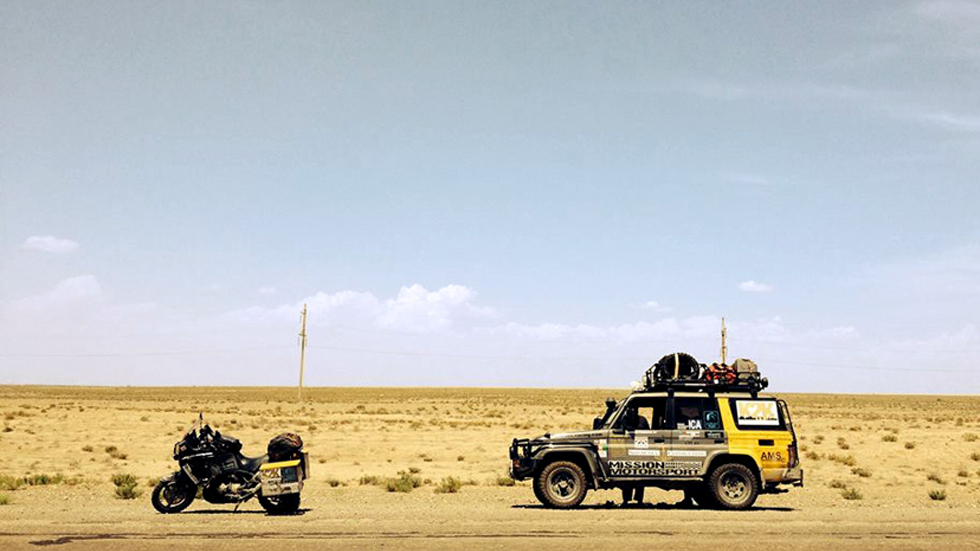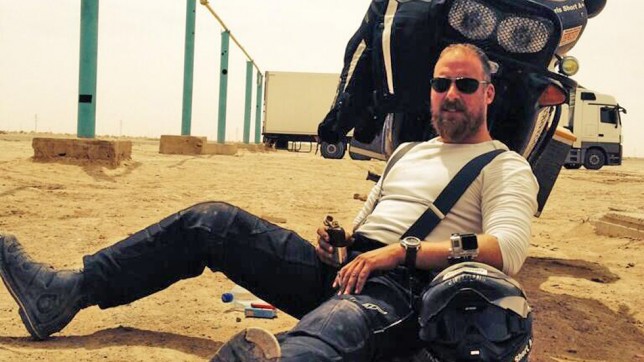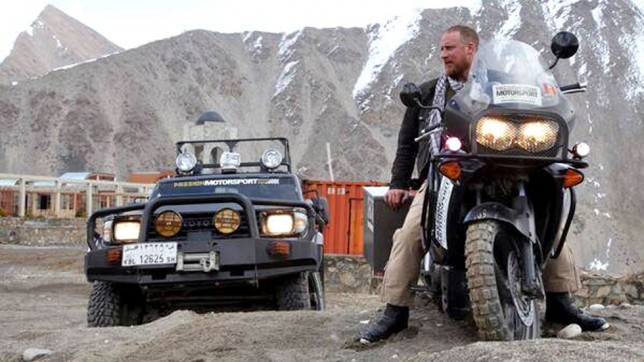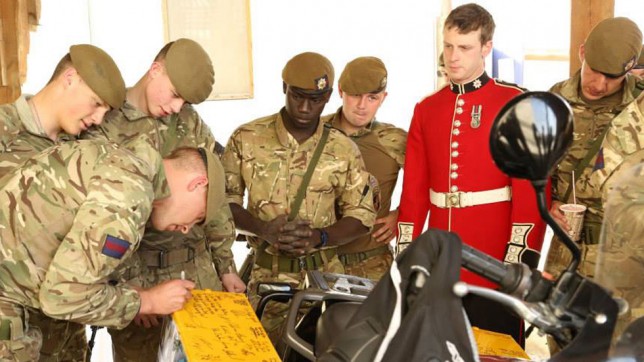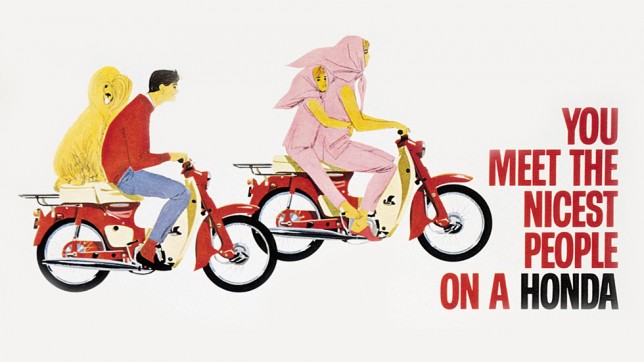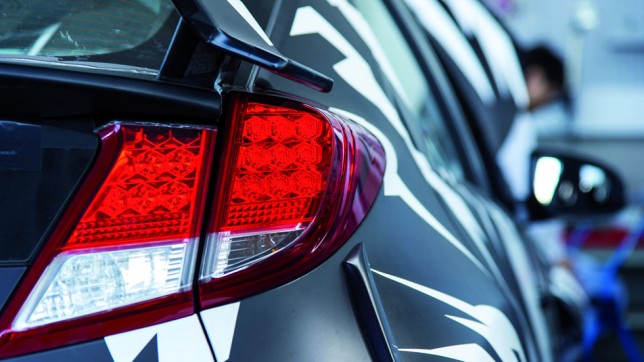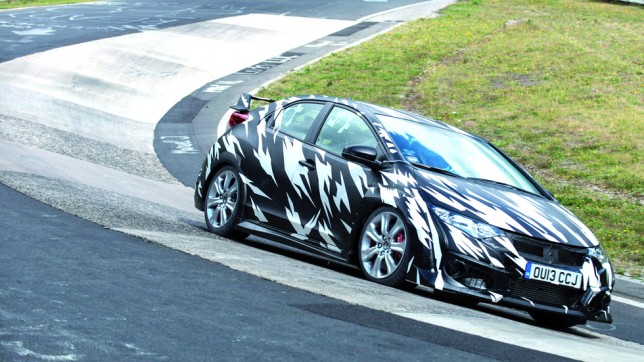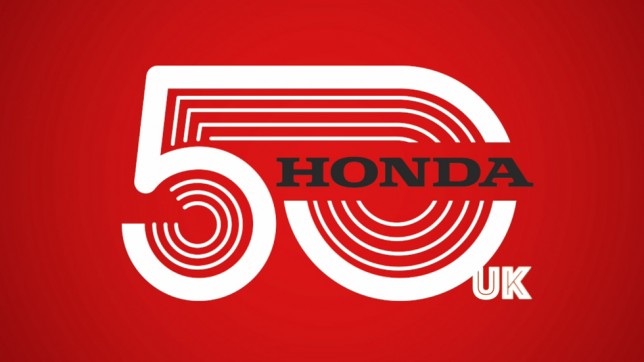by Jethro Bovingdon
It’s close to midnight in the Republic of Georgia when I speak to Chris Short. He’s at the side of a broken road again, preparing to sleep under the stars again, exhausted and elated from another day of tough riding, with many more ahead.
There’s a crackling delay on the satellite phone line but I can almost see Chris’s wide grin, a picture painted by the almost-awed tone of his voice. ‘It’s been everything I hoped for and a million things that never occurred to me,’ he begins. ‘In many ways the happiest days of my life… on the road with the guys, doing old-fashioned exploring – crossing the Caspian Sea, travelling through Azerbaijan to Georgia and meeting the incredible people along the way. It’s been magical.’
Fatigue is clearly setting in but there’s no hint of regret about taking on this challenge; and what a challenge. Chris is a former Royal Marine and over the past seven years or so has led major security operations in Iraq and Afghanistan for the US Department of Defence and the UN. He’s no stranger to tough situations, extreme environments and the sort of risk that comfy desk-dwellers would find simply terrifying.
Even so, this ‘K2K trip from Kabul to The Kennels clubhouse on the Goodwood estate takes in 16 countries and over 7500 kilometres, some of the most inhospitable conditions on Earth and very real danger. ‘I wouldn’t describe it as scary,’ says Chris (I would and so, probably, would you), ‘but certainly during the preparation the scale of the trip was daunting.’
Three men and a motorcycle
The trip itself might be epic but the support crew is modest, to say the least. Chris is riding a Honda XL1000V Varadero, supported by Domenic Senger-Schenck in a 4×4, which also provides transport for documentary filmmaker Laurence Cameron. That’s it. Three people. But this is a personal journey and the skeletal support seems apt, somehow.
Chris has lived in Afghanistan for some time and having a motorcycle has allowed him to see the country in a unique light. ‘I had a motorbike in Kabul when I first started working out there and it allowed me the freedom to get about the city with relative anonymity, I suppose,’ he remembers fondly. ‘It is the most astonishingly beautiful, breathtaking country and I wanted to ride through it and back to the UK. The idea behind the trip was a simple as that.’
Of course Chris is being modest. In recent times he’s sponsored various ex-military people who were raising awareness and money for those injured in the line of duty and in 2013 he set up Shorsec Racing, a professional racing team designed to capture the thrill and discipline of military service and raise money for Mission Motorsport.
‘In fact I came across Mission Motorsport by accident,’ says Chris. ‘I have a huge passion for motorsport and admire what they do… so I called them to ask if they would be our charity of choice for this adventure, which has been in planning for around 19 months. For me it was the perfect fit; an organisation helping military guys to do amazing motorsport events, still in that military-type environment. What’s not to like?’
Breaking the limits
The scale of Chris’ undertaking is unpeeled in layers when he talks about the planning and the journey itself. ‘There’s no provision for foreigners to even own a vehicle in Afghanistan and there’s a 250cc limit for motorcycles. I put some feelers out for around six to eight months and eventually a guy contacted me saying he could source something suitable. I ended up with the Varadero – which is definitely more than 250cc! It was just about roadworthy. The Landcruiser support vehicle we got from a scrap metal dealer, the engine was just alive and we coerced it back to the city and the preparation began in earnest.’
Kabul-based vehicle maintenance company No Lemon stepped in to help, ensuring the Varadero was mechanically sound and in good working order. ‘The bike is completely standard, though,’ says Chris; ‘the suspension, drivetrain. If you bought it brand new in the UK nobody would recommend this journey on it. It has a custom crush frame made from scrap iron and it’s had a minor service on the trip. That’s it. Both vehicles have been completely fantastic. And remember the bike has all of my gear on it as the Landcruiser was full of filming equipment. It weights about 324kg fully laden before I get on it and add another 100kg!’
The journey itself has been incredibly tough but clearly deeply rewarding and rooted in Chris’ love of Afghanistan and spirit of adventure. ‘I’ve lived in Afghanistan for two-and-a-half years now and it’s impossibly frustrating,’ he explains. ‘Sometimes it’s very, very sad and you have to really make an effort to remain positive. Then there are times when it’s joyous. The people are wonderful but there’s a huge amount of hardship. Not just the Taliban or the war, the stuff you see on TV. It’s the inequality, the huge disparity between the wealthy and the poor, the educated and uneducated, the rural and metropolitan populations.’
Chris’ passion and despair is evident and moving. ‘It’s a place full of clashing ideals and principals, no one aspect can sum it up… there’s such disparity. The vast majority of people are war weary but extraordinarily generous; they’d share their last piece of food with you.’
Defying expectation
As the journey has progressed so the cultures and the people change. ‘We’d heard so much negativity about Uzbekistan,’ begins Chris. ‘How hard it would be to get through the place, the police state… and sure enough getting into the country was very intrusive and took 11 hours. They stripped the vehicles, looked at search history and files on our laptops, confiscated our phones.’
There was the same procedure on the way out but in between was very different. ‘I don’t think I’ve been anywhere where people are so universally kind and welcoming,’ remembers Chris, his voice still laced with astonishment. ‘It’s a very inward facing country. I don’t mean that in a bad way necessarily, it’s just they don’t appear to care what’s happening in the outside world. They just worry about their own daily life. Most were excited to see us and even the police were a surprise, they didn’t intimidate at all, unlike the bullying tactics you can face in Afghanistan with the police.’
‘Kazakhstan was completely different again. They were completely disinterested. I think they’re a stoic nation, using words sparingly.’ Chris is clearly a little less fond of this part of the journey but that could be as much for the terrain as the people. ‘This was really, really hard. 500 miles across a boulder-strewn desert, there were no roads and so you had to be so careful. For example at night you had to find natural shelter to avoid somebody else hitting you as they bounced across the landscape, too.’ It’s a surreal, eye-widening image but just another sequence in this incredible and inspiring journey.
Once through the desert Chris and the team were stuck in the city of Aktau for 11 days, waiting for a ferry to arrive to take them across the Caspian Sea and on to Azerbaijan. ‘Nobody knew when it would arrive, it was massively frustrating,’ says Chris, still seething.
After Azerbaijan it was on to Georgia where Chris found the time for our amazing phone call. I was in a hotel at the time in Germany, about to compete in a motorsport event that I thought was pretty adventurous, exciting and uncomfortably dangerous. By the time I bid Chris farewell and good luck for the remainder of his journey that seemed a ludicrous concept. His is an extraordinary story and as it unfolds so it benefits a charity that does incredible work. He’s my new hero. I urge you to visit the Shorsec Racing website and to donate whatever you can.



